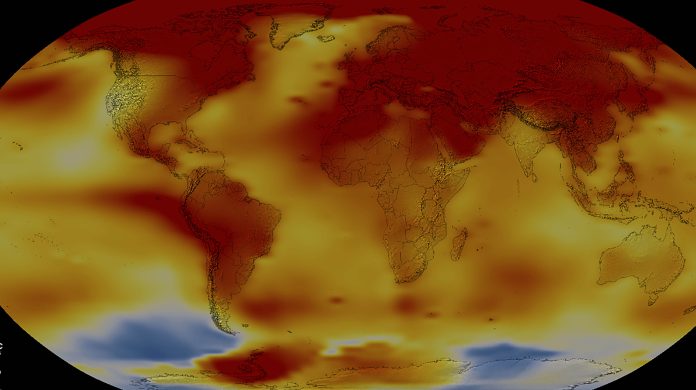Anoop Khajuria
Climate health is failing beyond the point of no-return, says the World Metrological Organization. The threat of 1.5 degree celsius global temperature rise is right upon us.
Almost all the climate health indicators are crossing previous thresholds. Greenhouse gas levels, surface temperatures, ocean heat and acidification, sea level rise, Antarctic sea ice cover, and glacier retreat have all surpassed their previous records.
In the first quarter of the New Year 2024, the latest report from the World Meteorological Organization squarely blames squatty human initiative to save the planet from the vagaries of climate change. The report trenchantly raises concerns in the recently concluded Ministerial Conference on climate held in Copenhagen aiming to accelerate climate action, to avert the most serious consequences of the climate crisis, and arduously attain the goal of limiting the global temperature increase to 1.5 degree celsius .
The data contained in the report indicates that the year 2023 witnessed extreme weather conditions such as heat waves, floods, droughts, wildfires, and ever-intensifying tropical cyclones. It has been the record warmest year and more alarmingly the global near-surface temperature has surpassed 1.45 degrees celsius above the pre-industrial baseline. Additionally, it marked the warmest 10 years on record. With only 69 months remaining before the completion of the Paris Agreement, the situation is alarming.
“Never have we been so close to the 1.5 degree celsius, the lower limit agreed in the Paris Accord,” says WMO Secretary-General Celeste Saulo. As the report reveals the phenomenon of unprecedented ocean warmth, has impacted at least one-third of the ocean ecosystem together with glacial retreat, Antarctic sea ice loss, and a marine heat wave on an average day. This will adversely impact crucial ecosystems and food systems. Irreparable damage to this planet is haunting the mankind in its spree of backfire.
In the recently concluded Climate Ministerial Conference at Copenhagen to discuss the priorities for this year’s UN Climate Change Conference (COP29) to be held in the Azerbaijan capital Baku is crucial to determine the course of action on the important issues and decisions taken at COP28.
The major decision at COP28 that Governments agreed to is the transition away from burning coal, oil, and gas for energy. The immediate action required is to stop opening new oilfields, gas fields, coal mines, fossil power plants, or other infrastructure. The science is clear that limiting warming to 1.5 degrees celsius leaves no room for new fossil fuel projects to be built. And there is an opportunity. The Governments are due to deliver a new chapter of National Climate Plans in 2025 (NDCs – nationally determined contributions to achieve goals of the Paris Agreement). This is an opportunity to build on emission targets with measures to curb fossil fuel production.
In another groundbreaking agreement at COP28, the countries agreed to triple global renewable energy capacity and double energy efficiency this decade. India has been a visionary nation having done remarkably well in this direction.
The demand for delivering finance is yet another target that began as an idea at the Glasgow meet but took shape in Egypt and has been delivered a bit in Dubai. Looking ahead to COP29, Governments are set to negotiate a new quantified collective goal for climate finance.
The timings of the WMO report and meeting of top climate leaders in person at Copenhagen who through the blend of plenaries and breakout sessions on NDCs, finance, climate adaptations, loss and damage, and mitigation have set the agenda rolling for COP29 from the Danish city of Elsinore.
To sum up, the next 20 months are crucial as has been very aptly described by Simon Stiell, Executive Secretary, UN Climate Change, “A world where every Nation is safe, opportunities are shared, and ten billion people are protected from climate impacts where clean energy is abundant and affordable. The decision that will get us there will be shaped in the next 20 months when new climate action plans are being formulated by each successive country. These NDCs 3.0 are the investment plans for the future.” Have we crossed the Rubicon? The International Energy Agency forecasts that demand for all fossil fuels will peak by 2030, even with no new climate policies.
Trending Now
E-Paper


